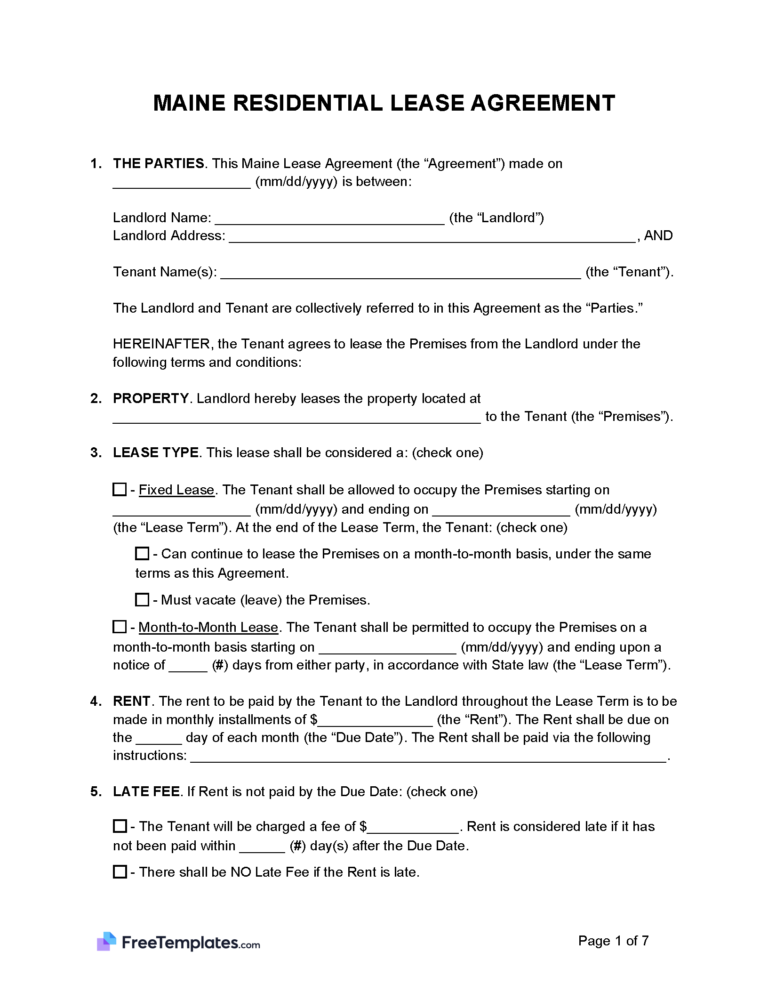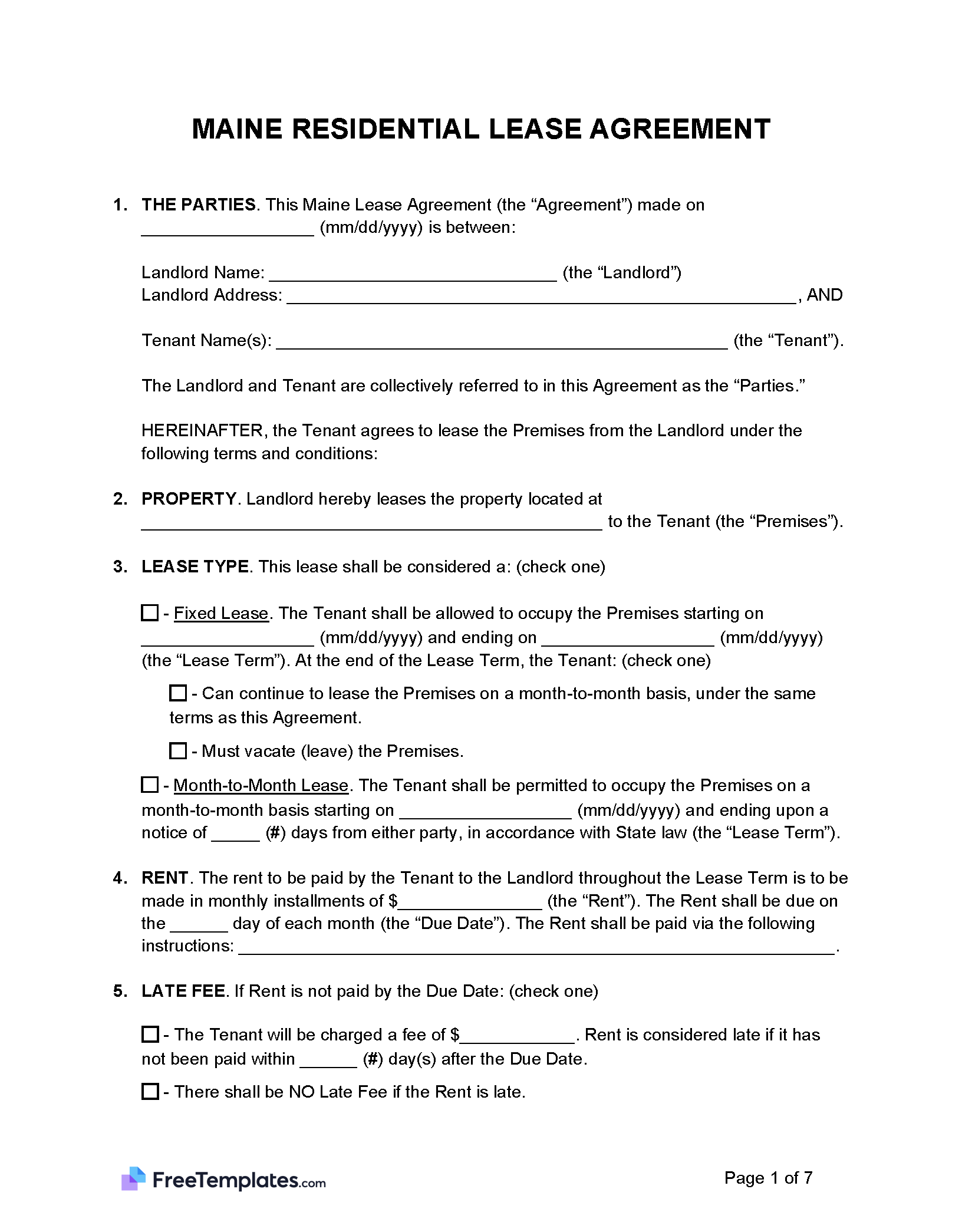By Type (6)
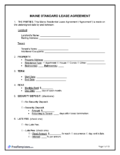 Standard Lease Agreement – This is the most common rental arrangement between a landlord and a tenant for a fixed term, typically one year. Standard Lease Agreement – This is the most common rental arrangement between a landlord and a tenant for a fixed term, typically one year. Download: PDF, MS Word, ODT |
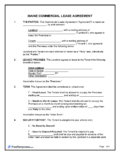 Commercial Lease Agreement – A legal document between a landlord and a business for a rental property. Commercial Lease Agreement – A legal document between a landlord and a business for a rental property.Download: PDF, MS Word, ODT |
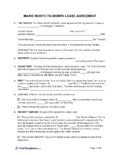 Month-to-Month Lease Agreement – A legally binding contract between a landlord and a tenant that renews monthly or every 30 days. Month-to-Month Lease Agreement – A legally binding contract between a landlord and a tenant that renews monthly or every 30 days.Download: PDF, MS Word, ODT |
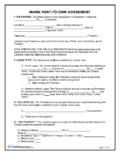 Rent-to-Own Agreement – To help create a pathway to home ownership, the property owner agrees to sell the rental property to the tenant after renting the property for a disclosed amount of time. Rent-to-Own Agreement – To help create a pathway to home ownership, the property owner agrees to sell the rental property to the tenant after renting the property for a disclosed amount of time.Download: PDF, MS Word, ODT |
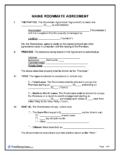 Roommate Agreement – An understanding between people who share a living space that is legally bound. Roommate Agreement – An understanding between people who share a living space that is legally bound.Download: PDF, MS Word, ODT |
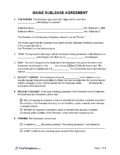 Sublease Agreement – With approval from the landlord, the tenant (sublessor), leases out all or part of the rental premises to a new tenant (sublessee) for a fixed amount of time. Sublease Agreement – With approval from the landlord, the tenant (sublessor), leases out all or part of the rental premises to a new tenant (sublessee) for a fixed amount of time.Download: PDF, MS Word, ODT |
Disclosures (8)
Bedbug Disclosure – Landlords cannot rent units known or suspected to be infested with bedbugs, and they must disclose to prospective tenants if adjacent units are infested or being treated. (§6021-A(2))
Energy Efficiency Disclosure – If the tenant is responsible for paying utility costs, they can obtain the consumption costs of the previous 12 months before signing the lease. The landlord must provide this upon request or include it in the rental application. This helps the tenant make informed rental decisions. (6030-C(1))
Lead-Based Paint Disclosure – The EPA requires all landlords to disclose any known lead-based paint on the interior walls, as well as provide information on how to detect and provide information on the dangers of the hazard. This only applies to properties built before 1978.
Radon Disclosure – Before a tenant enters into a lease or pays a deposit, the landlord must provide the date and results of the most recent test, whether mitigation has been performed, the tenant’s right to conduct a test, and the risks associated with radon. (§6030-D(2)). This does not apply to short-term rentals where the total lease duration does not exceed 100 days. (§6030-D(1-A))
Rental Housing Rights (Portland, ME only) – A copy of the City of Portland, Maine Rental Housing Rights must be given to a tenant renting from a property within the city limits. This document outlines city-specific rights and responsibilities, rent control, tenants at will, prohibited discrimination, and where to submit concerns, complaints, or questions.
Security Deposit Location – Landlords in Maine must keep the funds in a separate account from personal or business finances. However, it can be in a single escrow account used for multiple tenants under the same landlord. Upon request, landlords must disclose the account information. (§6038(1))
Smoking Policy – The landlord or their authorized agent must receive a written acknowledgment that they have received notification of the property’s smoking policy before signing a lease or paying a deposit. The notice must detail if smoking is prohibited on the premises, only in specified areas of the rental property. (§6030-E(3))
Utilities to Common Areas – The landlord cannot solely charge tenants for providing heat, electricity, and other utilities to a shared space in a multi-unit residential building unless there is a written agreement for a rent reduction or fair compensation. Any waiver to this in the lease will be void. If the landlord violates the law, they are liable for the damages or $250, whichever is greater. (§6024)
Security Deposit
Maximum Amount – Maine mandates that landlords cannot charge more than two months’ rent for a security deposit. (Source: §6032) A security deposit in Maine cannot exceed 3 months’ rent for mobile homes. (§9098(1))
Receipt – A landlord must give a written receipt of any funds received. The security deposit receipt must include the date, amount paid, the tenant’s name, and the period, and it must state that it is for a security deposit. The receipt must be signed by the person receiving the payment. This does not apply to rental agreements for units with 5 or fewer units, where the landlord occupies one of the units. (§6022)
Returning to Tenant – For written rental agreements, the landlord must return the full funds or an itemized statement for any retention with any remaining balance within the time disclosed on the lease agreement, but not exceeding 30 days. (§6033(2A))
- For leases without written agreements or without a fixed term, the landlord has 21 days to return the funds and/or give an itemized list of deductions. (§6033(2B))
Reasons for Keeping Security Deposit – Allowable reasons for withholding the security deposit in Maine include covering the costs of storing and disposing of unclaimed property and the nonpayment of rent and/or utility charges. (§6033(2))
- A security deposit may not be retained for everyday wear and tear of the rental property. (§6033(1))
Landlord Access
General Access – For non-emergency purposes, the landlord must give 24-hour notice before entering the rental premises at a reasonable time. (§6025(2))
Emergency Access – In case of emergency, including when the welfare of an animal is at risk, the landlord does not need permission to enter the rental unit. (§6025(2))
Paying Rent
Grace Period – The tenant has 15 days to pay rent from the date outlined in the lease agreement before the landlord can charge a late fee. (§6028(1))
Maximum Late Fee – The landlord cannot assess a penalty of more than 4% of the monthly rent. (§6028(2)) This fee must be disclosed in a written lease agreement. (§6028(3))
Returned Checks (NSF) – If a payment bounces due to insufficient funds, the landlord can assess a fee of 12% of the check’s value. (§6071(1))
Reasons for Eviction (4)
Non-Payment of Rent – If the tenant is more than 7 days late, the landlord can issue a 7-day written notice. If the renter pays all the rent owed before the end of the 7-day notice, the tenancy must be reinstated. (§6002(1C))
Non-Compliance – The landlord can serve a 7-day notice if the tenant, their family, or a guest has caused or permitted the dwelling to be unfit for human habitation. (§6002(1B)) The landlord can also serve a 7-day notice if the tenant changes the locks and refuses to give the landlord a duplicate key. (§6025(3))
Violence – The tenant or their guest is domestically violent towards, sexually assaults, or stalks others on the premises, including fellow tenants, the landlord, or their employees. (§6002(1D,1E))
Substantial Damages – The landlord can serve a 7-day notice if the tenant, their family, or a guest has caused substantial damage that has not been repaired. (§6002(1A))
